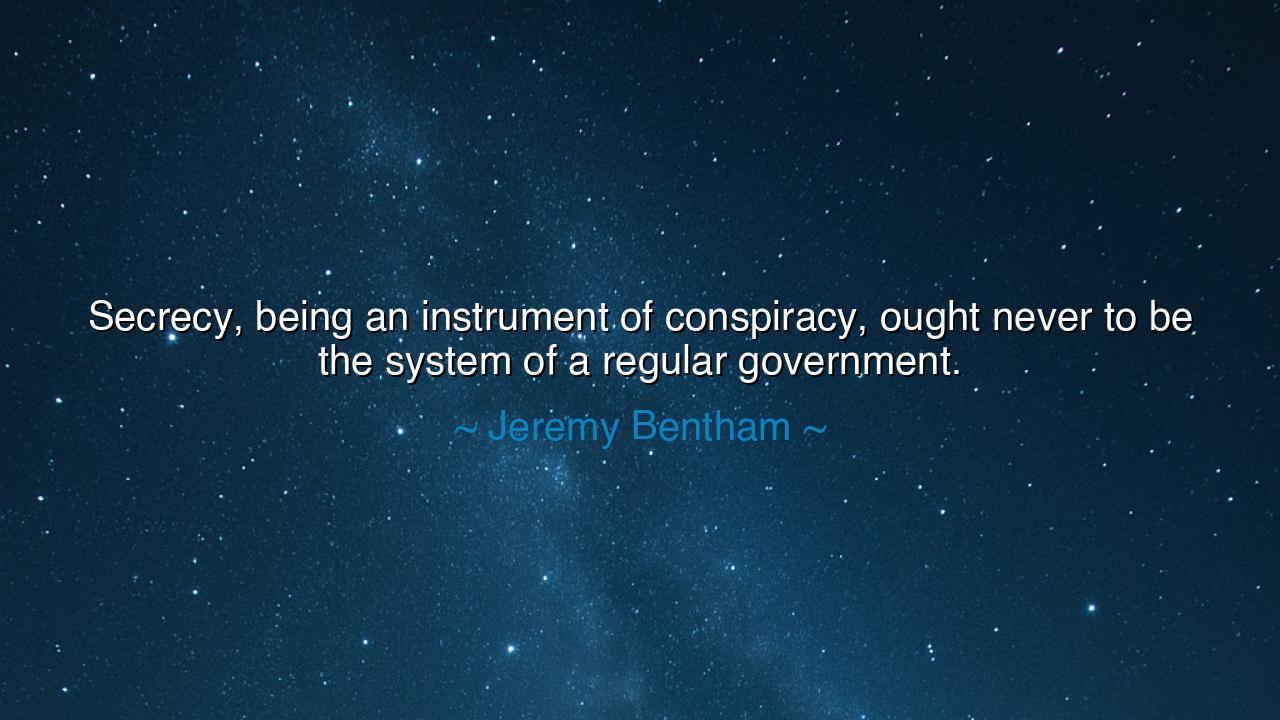
Secrecy, being an instrument of conspiracy, ought never to be the
Secrecy, being an instrument of conspiracy, ought never to be the system of a regular government.






"Secrecy, being an instrument of conspiracy, ought never to be the system of a regular government." – Jeremy Bentham
In these words, Jeremy Bentham, the great English philosopher and reformer, strikes at the very heart of power’s eternal temptation: the desire to conceal. His declaration is both accusation and prophecy. To him, secrecy was not merely a political tool but an instrument of deception, a weapon by which rulers hide their actions from those whom they are meant to serve. In Bentham’s moral universe, government exists for the benefit of the governed, and thus its first duty is transparency. Anything less—any veil drawn between authority and accountability—is the seed of tyranny. A “regular government,” one that rules by law and reason, must walk in the light; for the shadows are the natural dwelling of corruption.
The origin of this quote lies in Bentham’s lifelong devotion to the principle of utilitarianism, the doctrine that the best society is that which promotes the greatest happiness of the greatest number. He saw that happiness and justice could not thrive in darkness. When power operates unseen, it serves itself, not the people. Bentham wrote these words in a time when European monarchies cloaked their deliberations in secrecy and when the voice of the common man was excluded from governance. To him, secrecy was not prudence—it was conspiracy, a pact among the powerful to protect privilege at the expense of truth. His was the cry of a philosopher who believed that only openness could preserve liberty.
Throughout history, the wisdom of his warning has been proven again and again. Consider the Watergate scandal in the United States—a tale of secrecy, deception, and power turned inward against its own people. When leaders chose to hide their deeds, to erase evidence, and to mislead the nation, they did not strengthen government—they poisoned it. And when the truth came to light, it was not the exposure but the concealment that destroyed trust. Bentham’s words echo through that story: “Secrecy… ought never to be the system of a regular government.” The republic endured not because its leaders were flawless, but because the people demanded to see what was hidden. Transparency became the antidote to decay.
Bentham’s insight was not naive; he did not deny that some matters of state require discretion—diplomacy, defense, the guarding of innocent lives. But he understood a deeper truth: when secrecy becomes the rule rather than the exception, liberty perishes. A government too fond of shadows soon learns to fear its own people. It builds walls instead of bridges, and in that isolation, corruption grows fat. Light is the great disinfectant of public life; truth is the oxygen of justice. In the realm of politics as in the soul, concealment breeds rot.
There is an ancient resonance in Bentham’s philosophy. The Greek historian Thucydides once wrote that the downfall of Athens came not from defeat in war, but from deceit among its own leaders. When the people were denied knowledge, democracy withered. Similarly, in the Roman Republic, the Senate’s secret dealings paved the way for Caesar’s rise, for the people, blind to their rulers’ ambitions, could no longer defend their freedom. History thus bears witness: when government hides, tyranny approaches.
Bentham’s wisdom extends beyond statesmen—it speaks to every soul entrusted with responsibility. Whether in a family, a business, or a community, secrecy erodes trust. When decisions are made in darkness, suspicion festers. But when truth is shared, even painful truth, the bonds of fellowship grow stronger. A regular government, in Bentham’s sense, is not merely a political structure—it is a moral contract between rulers and the ruled, sustained by honesty, humility, and respect for the governed.
The lesson of Bentham’s quote is as urgent now as it was in his time: transparency is not weakness—it is the foundation of legitimacy. To rule openly is to honor the people; to rule in secrecy is to conspire against them. Let every citizen, then, demand light where there is darkness, and let every leader remember that authority without accountability is corruption in its purest form.
For as Bentham teaches, truth is the soul of justice, and justice, in turn, is the soul of good government. The moment secrecy becomes a system, freedom becomes an illusion. And thus, for the preservation of both dignity and democracy, we must forever guard against the shadows—and walk boldly, together, in the light.






AAdministratorAdministrator
Welcome, honored guests. Please leave a comment, we will respond soon